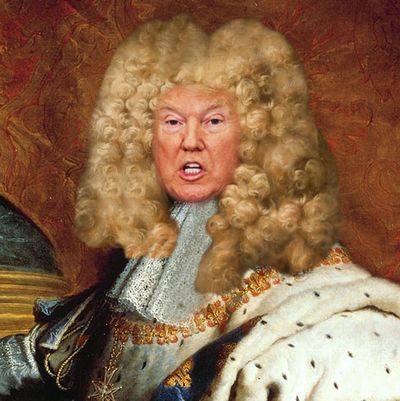
In his bizarre New York Times interview, Donald Trump expresses his characteristic assortment of fever-dream assertions. The president believes Hillary Clinton “was totally opposed to any sanctions for Russia,” that a properly amortized health-insurance plan would cost “$12 a year,” that Napoleon’s “one problem is he didn’t go to Russia that night because he had extracurricular activities,” and that Trump has somehow either carried out or reversed sweeping land reforms (“I’ve given the farmers back their farms. I’ve given the builders back their land to build houses and to build other things”). Yet a consistent idea manages to poke through the delirious rambling. Trump repeatedly affirmed his conviction that the entire federal government ought to be operated for his personal benefit.
Trump expressed this idea by returning several times to the phrase “conflict of interest.” Trump himself is of course the most personally conflicted president in modern American history. He has maintained a vast, undisclosed business empire and openly used his powers in office to enrich himself. But he does not mention this conflict of interest. Instead he applies the phrase to any law-enforcement official who might potentially get in his way.
The headline of the story was Trump’s anger that Attorney General Jeff Sessions recused himself from an investigation into the Trump campaign’s connections to Russia. The cause of the recusal flows self-evidently from basic legal principles. Sessions played a key role in the Trump campaign, so obviously he can’t conduct an investigation into it. In Trump’s mind, though, it is obvious that managing the investigation into the Trump campaign is the very thing his handpicked Attorney General ought to do:
Jeff Sessions takes the job, gets into the job, recuses himself. I then have — which, frankly, I think is very unfair to the president. How do you take a job and then recuse yourself? If he would have recused himself before the job, I would have said, “Thanks, Jeff, but I can’t, you know, I’m not going to take you.”
It is not as if the job of overseeing the Russia investigation is not being done. What Trump objects to is the fact that he was deprived of the chance to choose the official who is overseeing it.
Trump goes on to explain — or, to put it more accurately, gesture at — his belief that everybody else in government is fatally conflicted. Robert Mueller is conflicted because he interviewed to be the head of the FBI to replace James Comey. The acting FBI director is conflicted because his wife ran for state Senate as a Democrat. Mueller’s staff is conflicted. Deputy Attorney General Rod Rosenstein is conflicted because he’s “from Baltimore … There are very few Republicans in Baltimore, if any.” (Rosenstein is not from Baltimore, and was appointed as a U.S. Attorney by George W. Bush.)
In contrast to Trump’s notion that he is surrounded by officials fatally conflicted by loyalties to causes other than Donald Trump is his belief that he possesses the legitimate authority to control law enforcement as he pleases. He paints the role of the FBI director as his personal subordinate. “The FBI person really reports directly to the president of the United States, which is interesting. You know, which is interesting,” he says.
It is true that the FBI director reports to the president. That is one half of a delicate but vital constitutional arrangement designed to ensure that neither the FBI director nor the president can amass completely untrammeled power over law enforcement in a way that would invite political abuse. That is why the FBI director has a ten-year term, rather than serving as a political appointee like other Executive branch officials. And it is why the bureau has the foundational creed that elected officials cannot interfere with any investigation. Instead, Trump reaffirms his view that he has the right to stop any law-enforcement investigation at will: “I could have ended that whole thing just by saying — they say it can’t be obstruction because you can say: ‘It’s ended. It’s over. Period,’” he states.
Six months into his presidency, foundational republican concepts remain as foreign as ever to Trump. He believes the entire federal government owes its personal loyalty to him, and that the office of the presidency is properly a vehicle for personal and familial enrichment. If the rule of law survives this era intact, it will only be because the president is too inept to undermine it.






























